Dell Technologies Cloud and Google Cloud Launch OneFS for Google Cloud Hybrid Storage Solution
Advancements reinforce hybrid cloud leadership and help organizations speed up and simplify deployments
This is a Press Release edited by StorageNewsletter.com on May 25, 2020 at 2:38 pmDell Technologies, Inc. and Google Cloud launch OneFS for Google Cloud to help organizations control exponential data and application growth and ease the flow of files across their private clouds and Google Cloud.
The company also is reducing the barrier of entry and improving overall capabilities for hybrid cloud deployments with additional the firm’s cloud advancements. Customers now can move workloads across public and private clouds with greater flexibility and adopt a hybrid cloud approach that best fits their needs while reducing costs. According to Forrester, customers using Dell Technologies Cloud over the course of 3 years could see an incremental ROI of more than 170% and recoup their costs in fewer than 6 months (1).
“Data and workloads exist everywhere – at the edge, in core data centers and public clouds. And, while data and apps are multiplying, IT resources and budgets are not. For companies to turn their data into competitive differentiators, they need a way to manage it seamlessly and consistently, no matter where it resides,” said Deepak Patil, SVP and GM, cloud platforms and solutions, Dell. “Dell Technologies Cloud brings the best of the public cloud to the data center and the best of the data center to the public cloud, removing complexity so companies can spend less time managing their infrastructure and more time delivering value to their customers.”
Click to enlarge
Dell Technologies Cloud and Google Cloud deliver hybrid cloud for file storage
OneFS for Google Cloud delivers a native cloud experience that combines the scalability and performance of scale-out NAS from the industry’s number one provider of storage systems, the company (2), with Google Cloud’s analytics and compute services. Now, firms can move and access HPC and demanding workloads, as large as 50PB, in a single filesystem between on-premises Dell EMC Isilon filesystems and Google Cloud without having to make changes or adjustments to their applications.
Click to enlarge
According to a report from Enterprise Strategy Group, while file data often accounts for at least half of an organization’s on-premises data, very little of it is stored in public clouds, primarily due to performance and scale limitations (3).
Take the M&E industry, for example. Video files with 4K resolution demand terabytes of storage and require high throughput and low latency file storage, which makes it challenging for production companies to manage large file workloads in public clouds. With OneFS for Google Cloud, they can work across private and public clouds with consistent operations and have the flexibility to scale.
“We’re proud to partner with Dell Technologies to deliver high-performance, scalable cloud storage services to our customers with OneFS for Google Cloud,” said Rich Sanzi, VP, engineering ,Google Cloud. “Through this partnership, customers can more quickly and effectively leverage Dell Technologies storage solutions through Google Cloud and have access to the best of breed file storage solutions, across hybrid cloud environments.”
Modern apps experience in every cloud
Dell Technologies Cloud, which integrates infrastructure and services across the firm’s portfolio, makes hybrid clouds simpler to deploy and manage regardless of where data and applications reside. With the firm’s cloud advancements, organizations can more create a modern applications experience in every cloud, close the cloud-native skills gap and get the most out of their entire infrastructure.
Dell Technologies Cloud Platform provides a simple and direct path to Kubernetes from a single environment, with support for containerized workloads and traditional virtual machines on the same Dell EMC VxRail infrastructure. This approach integrates VMware Cloud Foundation 4.0 and VxRail into a single solution, enabling a consistent approach across all cloud locations. VMware administrators can use familiar tools to manage modern apps that combine both containers and virtual machines from a single operating environment.
Lowering adoption barriers and expanding support
With the Dell Technologies Cloud Platform subscription model and deployment services, available through Dell Technologies On Demand, customers now have more choices for consuming cloud infrastructure and can get up and running in as little as two weeks. With new node configuration options that include as few as 4, nodes, customers can begin their hybrid cloud journey at approximately half the cost and smaller footprint and grow their cloud deployment over time.
The platform offers customers a self-managed solution. For customers seeking a cloud service, the company also announced the next-gen of VMware Cloud on Dell EMC featuring an enterprise scale, 42 rack unit infrastructure, doubling the amount of supported processor cores, memory options and NVMe all-flash storage. The cloud service is now also certified with VMware Horizon to support BC efforts through the delivery of virtual desktops and applications to remote workforces as well as to healthcare workers in hospitals and clinics. VMware Cloud on Dell EMC, which offers data center as-a-service capabilities, provides customers with more simple, secure and scalable infrastructure at their on-premises data center and edge locations.
Modernized networking with SD-WAN
Dell Technologies Cloud is extending its capabilities to networking with new updates to Dell EMC SD-WAN solution powered by VMware. Customers now have more appliance and bandwidth capability options for rapid deployment of SD-WAN in a single solution. This helps improve performance for demanding workloads, like VOIP, video streaming and VDI, and ensure application performance and BC.
Matt Eastwood, SVP, enterprise infrastructure, cloud, developers and alliances, IDC, said: “What we’re seeing is more businesses think like innovators. They are acknowledging they need both public and private clouds as the technology foundation to deliver much needed agility, scale and speed. What’s important is not to push one cloud or infrastructure approach over another, but to provide simple, consistent operations across all clouds This is what Dell and Dell Technologies Cloud is well positioned to do. Its partnership with Google and the advancements in its portfolio give customers better control of their workloads across their entire infrastructure.”
James Lowey, CIO, Translational Genomics Research Institute, said: “As a leading non-profit organization dedicated to conducting groundbreaking research with life-changing results, one of the things we’re keenly aware of is that our patients don’t have the luxury of time. We feel it’s really important to take our workflows and be able to compute against the data where it lies. In taking a hybrid approach, we can have these cloud native workflows and run them on internal resources and private and public clouds. As a longtime Dell EMC Isilon customer, we moved our entire high-performance computing infrastructure to an Isilon storage foundation. Having OneFS in Google’s cloud is particularly exciting because it allows us to take the data from our private cloud in our high-performance computing lab into the public cloud, giving us a whole new dimension of capabilities that we could really only dream of a year ago.”
(1) Forrester study The Total Economic Impact of Dell Technologies Cloud” commissioned by Dell Technologies, VMWare and Intel Corporation, May 2020. Results based on 8 customer interviews on the cost savings and business benefits enabled by Dell Technologies Cloud hybrid cloud platform. Actual results will vary. Full report.
(2) IDC WW Quarterly Enterprise Storage Systems Tracker, 2019Q4, March 12, 2020 – Vendor Revenue.
(3) Enterprise Strategy Group – Performance Testing of Dell Technologies Cloud OneFS for Google Cloud, estimate based on comparison of publicly available specifications and performance benchmarking results for a competing vendor’s NAS solution and Dell Technologies Cloud OneFS both on. Actual results may vary. White Paper .
Resources:
Blog: Introducing New Standard for File in Cloud
Blog: 2nd Generation Dell Technologies Cloud Data Center-as-a-Service
Blog: Simplifying Modern Applications Journey With Dell Technologies Cloud Platform
Blog: Dell EMC SD WAN Solution Powered by VMware Offering for Even More Modernization
Blog: Proven Again! Simple Cloud Protection Solutions with Google Cloud VMware Engine
Comments
Classic in May for quite long time with EMC and more recently with Dell Technologies, the company announces new products during its annual user conference. Current circumstances transform this annual rendez-vous into point products announcements and the impact is certainly not the same. Following PowerStore a few days ago, Dell insists on its scale-out NAS Dell EMC Isilon solution and this analysis is limited to this product.
The first surprise is that Dell drops Isilon name in this cloud product launch as it is promotes as Dell Technologies Cloud OneFS for GCP if you read the first paragraph of the press release above. OneFS is the name of the file system coupled with the FreeBSD OS. Isilon introduced OneFS early 2000's and the company was later acquired in November 2010 by EMC for $2.25 billion.
The announcement is co-produced by Dell and Google. Dell officially published a press release and Google has preferred a blog post. On this blog post, there is no mention of Google Filestore and especially its scalable flavor based on Elastifile acquired in July 2019 for a ridiculous price demonstrating the very limited product and market penetration. It explained the necessity to find an exit and the small transaction. We still wonder why Google made this move except it was a bargain.
There is also an other fuzzy message about running HPC and AI/ML applications on OneFS as Google promotes clearly DDN ExaScaler, based on Lustre, for such workloads and needs, it is the official position of Google available here. The image below was taken during recent Super Computing conference in November 2019.
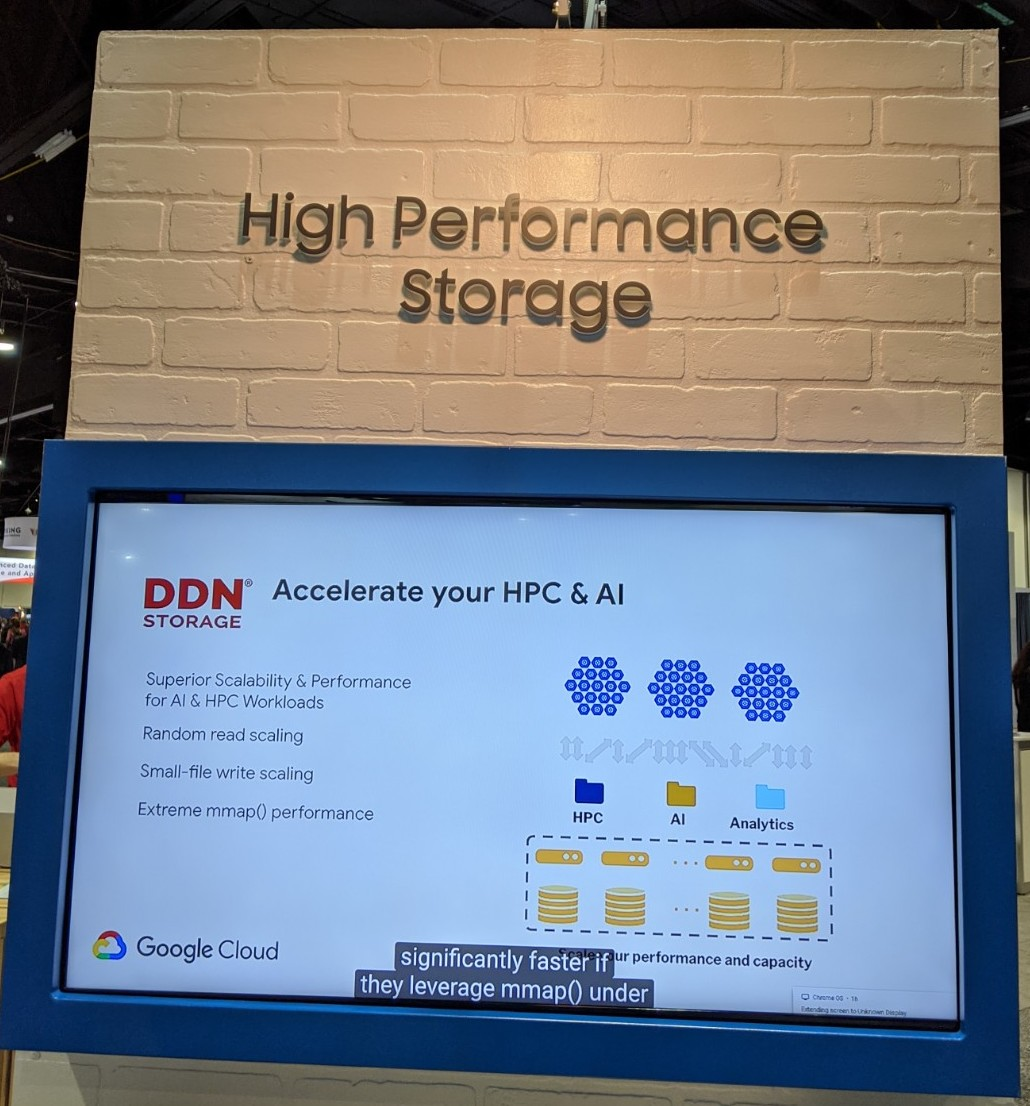
To limit revenue erosion, all historical on-prem and CapEx storage vendors have started to promote hybrid IT model. They all argue that cloud is finally expensive but all these remarks come from these HW vendors. This opposite is obviously wrong, how an on-prem vendor can promote full cloud or cloud native IT model, it would be a suicide... and of course, they try to offer subscription models as well.
Therefore Dell promotes here a hybrid model between on-prem and GCP. So immediately we can see that the multi-cloud strategy is very limited even non existent. It would be good to support at least two public clouds.
This announcement is in fact the second phase of the demonstration made in May 2018 at Dell Technologies World, 2 years ago, with Isilon Cloud for GCP. Again today it is renamed Cloud OneFS for GCP, bizarre. Also Dell finally didn't choose to run IsilonSD Edge as it presents some real limitations but it could have been enough for some use cases.
This release speed is clearly not aligned with the agility of enterprises' business, the IT change pace and DevOps as well.
This offering is built on Gen6 hardware with OneFS able to scale up to 50PB, largely enough for lots of various use cases. But only one file system exists within a Isilon cluster. File size is limited to 16TB, pretty small in current unstructured needs, even if recent release increased that size from 4TB, but it's still a real limitation. A good advantage on-prem can be seen here as a real limitation in the cloud as it kills one of the cloud attribute which is the multi-tenancy aspect. It could be seen as security or isolation characteristic but each customer requires its own cluster, therefore Google and Dell needs to deploy a new physical cluster every time.
One instance shared across different tenants is not recommended except if different namespaces or filesets exist but it requires fine granularity for quotas, meta-data segmentation, separated analytics, dedicated QoS... not easy at all as OneFS was not designed to offer these various separated views.
This multiplication of clusters is of course transparent for users but it is probably translated in the price.
So in term of topology, client uses one (could be more of course) on-prem cluster connected to one close to a Google Cloud data center. The billing is made through Google. The configuration is supported and metered by Google integrated directly into the Google Cloud console as well and managed by Dell Enterprise Services. As of today, the service is available in 3 regions: us-east4 in Ashburn, VA, australia-southeast1 in Australia and asia-southeast1 in Singapore.
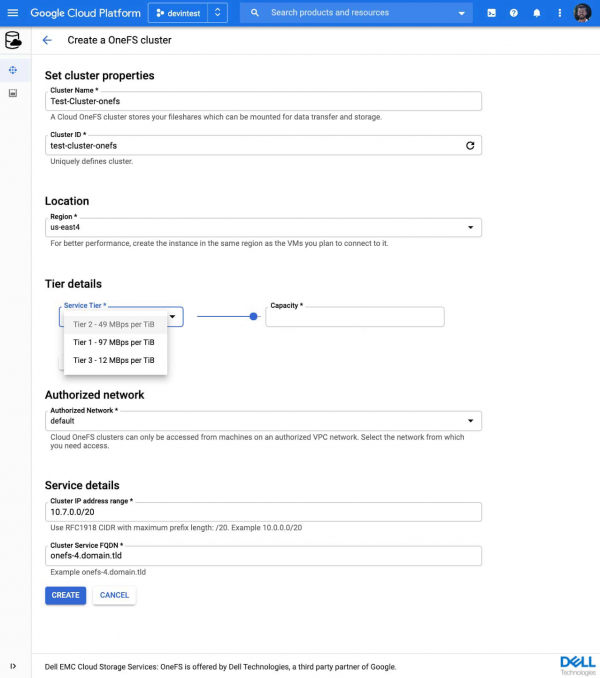
It's new for EMC but it's not new for the market, the table below illustrates cloud presence for top file storage vendors exposing NAS protocols:
| Companies | On-Prem | AWS (Marketplace presence) |
GCP (Marketplace presence) | Azure (Marketplace presence) |
| Dell |
Y Dell EMC Isilon |
- |
Y (Y) Cloud OneFS for GCP |
- |
| NetApp | Y |
Y (Y) Cloud Volume Services or Cloud Volumes ONTAP |
Y (Y) Cloud Volume Services or Cloud Volumes ONTAP |
Y (Y) Cloud Volume Services offered as Azure NetApp Files or Cloud Volumes ONTAP |
| Pure Storage |
Y FlashBlade |
- | - | - |
| Qumulo |
Y Hybrid Cloud File Storage |
Y (Y) | Y (Y) | Planned |
| VAST Data |
Y Universal Storage |
- | - | - |
For colocation model connected with VPC, we can list also Infinidat with Neutrix Cloud and Zadara. They can expose file but also other protocols. VPC is the Google name for Virtual Private Cloud, AWS uses Direct Connect and Azure ExpressRoute for similar services.
We'll see how competition will react to this announcement especially top leaders of the segment.








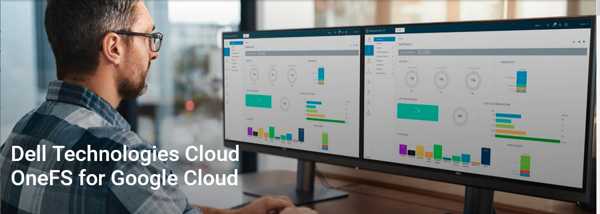
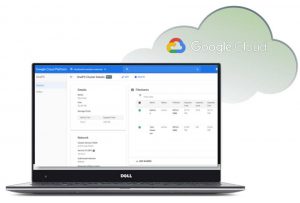
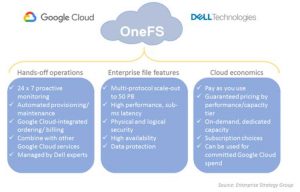
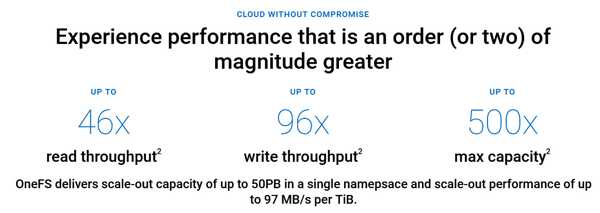





 Subscribe to our free daily newsletter
Subscribe to our free daily newsletter

